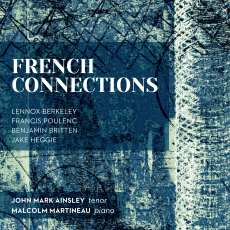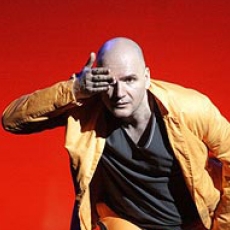John Mark Ainsley - French Connections - Opera News
RECITAL ALBUMS ALL HAVE SILLY TITLES NOW. Most of them used to go by a single title—“My Senior Recital, I Hope You’ll Come”—but there is at least a bit of justification for this one. Poulenc and Britten both set the same Shakespeare text, “Fancy,” and the two songs are notable for the way each of the composers, who ordinarily wrote music that sounds like no one else’s, in this instance each wrote something not very individual. The generating idea for this recital was perhaps Jake Heggie’s song cycle Friendly Persuasions. John Mark Ainsley and Malcolm Martineau gave the premiere (in 2008), and Gene Scheer’s text refers to Poulenc’s cycle Tel Jour Telle Nuit, which is also on the program. For the third song Scheer writes a gloss on the Louise de Uilmorin poem “C’est ainsi que tu es,” memorably set by Poulenc, and Heggie’s Poulenc pastiche is skillfully done. But the big bookends of the recital, Lennox Berkeley’s Five Poems Opus 53 and Britten’s Holy Sonnets of John Donne, are full-bore British.
Berkeley did write more than a dozen songs to French texts, but here he is setting words by Auden. This cycle is perhaps more rewarding for the performers than for listeners, but (once past a perplexing, urgent version of the first song) Ainsley and Martineau give a thoughtful performance, with Ainsley even correcting a misprinted word in the third song. The fourth song is marked “freely but intensely,” qualities that are well projected and that also suitably mark the performance of Tel Jour Telle Nuit. Ainsley is particularly good in the ominous, denatured setting of “Une roulette couverte en tuiles.” In the recording by the work’s creators, Poulenc and Pierre Bernac, the singer is caught in loose voice, barely under control, so Ainsley’s version is welcome. Poulenc as a pianist had a way of setting a song slowly spinning, like planets in orbit. Martineau has other goals and is not always inclined to equipoise, but this new recording is one of the best we have.
The Holy Sonnets of John Donne have been lucky on records. Here, Ainsley and Martineau give a performance of extremes. The dynamics are almost operatic, and Ainsley turns “O might those sighes and teares” into something self-lacerating that Britten’s Captain Vere might sing. “Batter my heart” (the poem also set by John Adams in Doctor Atomic in polar-opposite fashion) and “Thou hast made me” are perhaps the fastest ever heard, with some piano detail lost in the welter. Compared to another fine recent version, from Mark Padmore and Roger Vignoles, Ainsley has a bit reedier, thinner voice, but he also offers a specific gift. He is able to make those poems, and even his particular interpretations of the poems, completely comprehensible as sung.
Texts and translations, critically important in the elusive Eluard poems set by Poulenc, are included in the booklet, which is not to be taken for granted anymore. (Although “Bluet” is printed without the lineation that makes the point of the poem.) The piano is recorded in too much of a misty depth, obscuring some fine detail in Martineau’s pianism and some very specific pedal requests from Britten and Poulenc.


